More than 10 million kids will attend a camp this summer, but only a small percentage will get the opportunity to attend a farm camp … and for many urban children, it will be one of the few times they will actually get to step foot on a farm.
We talked to three successful farm camps to find out why they decided to open their barn doors to youth each summer, what a typical day at farm camp entails, and why other farms should consider inviting kids out to the country.
Arcadia Farm Camp
Alexandria, Virginia
Located just a few short miles from downtown Washington, D.C., Arcadia’s two farms encompass four acres, providing a sustainable model of agriculture for new farmers, students, and the public through hands-on community engagement. Arcadia Farms grows food for educational programs as well as for two Mobile Markets that serve low-food access neighborhoods. Last year the farm produced 80,000 servings of healthy food.
First opened in 2012, Arcadia Farm Camp allows campers to discover where their food comes from through hands-on farming, cooking, and eating experiences. Children, ages 6 – 11, are invited to learn about sustainable agricultural practices by caring for chickens, collecting eggs, turning compost, planting, weeding, irrigating, harvesting, studying bees and pollinators, and creating natural pest repellents.
Pamela Hess, Executive Director, Arcadia Center for Food and Sustainable Agriculture, said the most popular question the camp receives from parents is: “Is there a farm camp for grownups?”
“Most children, regardless of where they live, have very little understanding of where their food comes from,” Hess said. “Some are surprised (and a little put off) to learn it comes from the soil. Introducing them to the origins of healthy, delicious food is one of the primary functions of Farm Camp. They learn to grow it and love to eat it.”
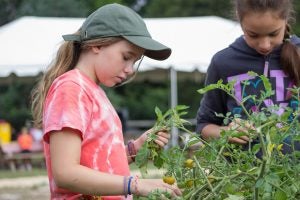
The camp, which kicks off July 10 this year, has a new theme each week. This summer campers can register for themes, such as Young Farmers, Farm Creatures, Seasonal Eaters, and Small Chefs.
A typical day at Arcadia Farm Camp can range from compost explorations and making fresh salsa, to time with visiting educators, such as farmers and chefs, who teach campers about bees, goats, and other livestock, and how to prepare healthy meals and snacks from farm grown food.
“Children bond strongly to the farm when they are here and learn to love and appreciate the hard work that goes into getting food on the table,” Hess said. “Children thrive on the farm, away from electronics, and in the elements where they can truly be kids. It’s a great investment in the next generation’s health and their support for agriculture as they grow older.”
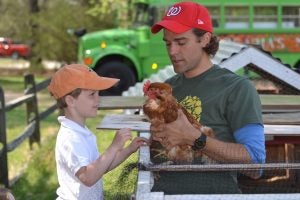
For a farmer looking to start a camp like Arcadia, Hess suggests conducting some research first.
“There’s a big market for camps like ours — it is sold out every year,” Hess said. “Research and adhere to all applicable laws and contact the American Camp Association to find out best practices.”
Bull City Farm Camp
Rougemont, North Carolina
Samantha Gasson has been teaching camps by word of mouth for the last 18 years, but it wasn’t until 10 years ago Gasson started formally teaching farm camp.
“I have always loved sharing the farm with anyone with an interest, but it was after having kids of my own that the idea of formally teaching on the farm became more important,” Gasson said. “I started out just inviting friends of my children but it quickly became friends of friends of my children. Once I realized how popular our camp had become I started making more focused camps for a larger audience.”
Gasson and her husband Scott purchased their Northern Durham County farm in 2014. Today she is the director of the camp and runs the day-to-day on the farm including moving, loading, and care of the animals. With a full-time off-farm job, Scott joins in every weekend and all three kids contribute from being camp counselors to filling waters. The family also utilizes extension agents whenever possible to help.
Bull City Farm is not a big farm, but more of a niche operation. The family raises lamb, beef, pork, and eggs for direct to consumer sales and restaurants.
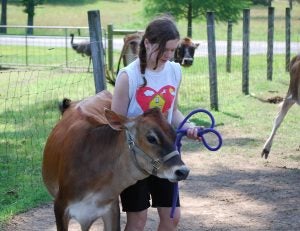
“Having city kids out to the farm has made us realize how little the general public knows about any sort of farming,” Gasson said. “We have also learned how much they crave the time in the country working with farm animals.”
Campers get the opportunity to learn all about the animals. This year Bull City will host a Cow Camp, a Story Telling Camp, a Fun and Games on the Farm Camp, and a How to Train a Farm Animal Camp.
The camps are a way for the Gasson family to share a lost art to an ever-growing urban, disconnected population.
“People are losing the connection between the land and their food. It is hard for people who don’t have any experience with farming to feel compassion towards the plight of farmers if they have no direct experience,” Gasson said. “Exposing our children to farming, not matter its form, will make them more informed and thoughtful adults when it comes to farming issues.”
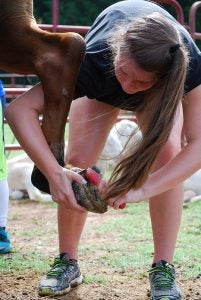
Gasson’s advice to other farmers considering hosting summer camps:
- Keep it simple.
- Unless you have done a lot of teaching, hire an educator. It takes planning and a knowledge of education to have a successful camp.
- Even the most mundane and boring tasks are fun for most kids.
“Hosting summer camps is a lot of work if you want it done well, it is also lucrative,” Gasson said. “I can’t emphasize the importance of hiring someone knowledgeable if you do not have the skills yourself.”
The Country Experience Farm Camp
Elizabeth, Illinois
After Ed Amstutz’s children returned from a farm camp in Ohio with a deeper understanding of what it takes to make a home and a living on a farm, the family decided they needed to create the same opportunity for families in Northwest Illinois.
“We heard from so many parents that they too were looking for real-life experiences for their children, so we decided to help provide that,” Amstutz said. “Further, being on the farm allows our family to live in a beautiful place, to breathe clean air, and to raise food in a way that we’re proud to serve it to our friends and neighbors.”
The Amstutz family purchased their historic farmstead in Jo Daviess County in 2014. This summer will be their fourth year hosting The Country Experience Farm Camp.
Last summer Country Experience had five times as many campers as their first year in operation, and this year Amstutz expects that number to double again. In fact, the response to summer camp has been so strong that they’re expanding to welcome farm stays during the spring and fall, and to host school groups for extended overnight trips anywhere from 3 to 13 days.
As the family built and developed the farm, they’ve received a ton of help from local farmers, the Farm Bureau, the local extension office, as well as a number of long-term growers eager to share their experience.
“We’ve found that a humble attitude, and a willingness to learn from our mistakes, has made it easier to learn the things we didn’t know and put specific practices in place,” Amstutz said.
With nine different types of livestock, three gardens, a grape arbor, an orchard, and seven rotational pastures, Amstutz said there is always something new to learn.
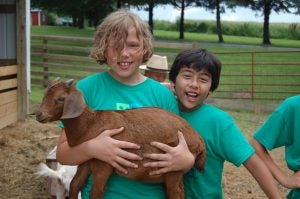
The Country Experience Farm Camp allows children a lot of freedom to choose the activities on the farm that they would like to experience. Everyone completes chores, but they also help with projects, and play a lot.
“Our goal is to use the real work of the farm to allow children to learn about themselves, and develop life skills like decision making, attention to detail, cooperation, care of self and others,” Amstutz said. “We treat campers like members of the family farm, we eat family style, we work shoulder to shoulder, respecting their ability to contribute, valuing what they can do, and training them to be a meaningful part of the farm environment.”
The Country Experience often hears the question, what really is there to do on a farm? With other camps offering climbing walls, archery, and trips into the wilderness, what would a kid do for a week on a farm? Amstutz tells them “there are literally hundreds of things to do on a farm, and every one of them can be fun and meaningful because they actually matter (and therefore the child matters) in the real world. ”
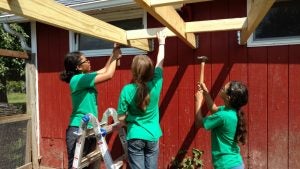
“Farm kids are used to being trusted, baling hay right alongside Mom and Dad, helping with chores, and working with the chickens and rabbits, goats and calves,” Amstutz said. “For many children though, they are amazed to learn that they personally, at an age of 7-12 years old, can play a meaningful role in a thriving business. It’s impressive to see a child learn that their time and energy, like harvesting cherries and making them into jam, or collecting, cleaning, and packing eggs, can turn into a product an adult (other than their own parents) would purchase.”
Even if families can’t commit to a week-long farm camp, Amstutz suggests taking children on day-long farming field trips. His family loves Fair Oaks Farm in Indiana to learn about tech, automation, and farm efficiency. They also like visiting Kline Creek Farm in the western suburbs of Chicago for a look at a historic family farm.
Amstutz said if farmers are considering opening up their farm gates to campers, they should take what they do best and share it.
“If you’re a great grain farmer, figure out what makes you awesome, and develop a way to communicate and share that with children,” Amstatz said. “A farm bureau mentor once told me, ‘a great farmer would be great at a lot of things. A terrible farmer would be terrible at a lot of things. It’s not technique only, it’s life skills that make the difference.’”



